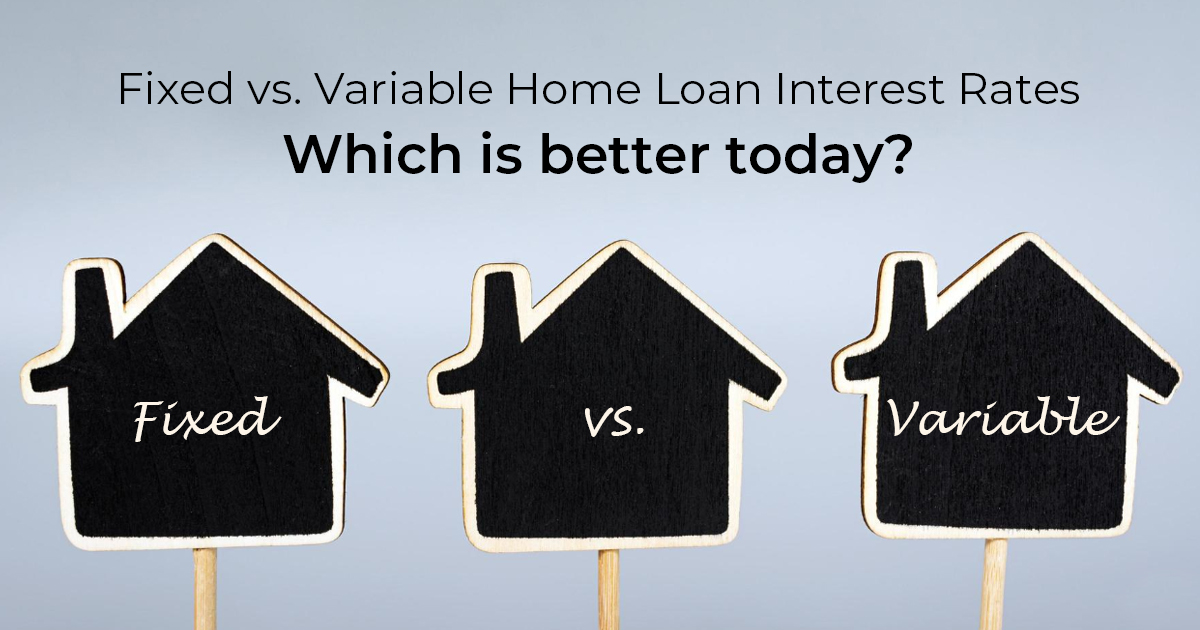When it comes to securing a home loan, one of the most important decisions you’ll need to make is whether to opt for a fixed or variable interest rate. Each option has its own advantages and disadvantages, and the best choice for you will depend on your financial situation, goals, and the current economic environment. In this blog, we’ll break down the differences between fixed and variable home loan interest rates and help you decide which might be better for you today.
Understanding Fixed and Variable Home Loan Interest Rates
Fixed Interest Rates
A fixed interest rate on a home loan means that the rate remains the same throughout the term of the loan. Here are some key features of fixed interest rates:
- Predictability: Your monthly contractual payments remain constant, making it easier to budget.
- Stability: You are protected from interest rate fluctuations in the market.
- Higher Initial Rates: Fixed rates are generally higher than initial variable rates.
Variable Interest Rates
Spend quality time together engaging in activities you both enjoy. Whether it’s exploring new places, trying new hobbies, or simply relaxing at home, prioritize making meaningful memories together.
Variable interest rates, also known as adjustable rates, can fluctuate over time based on changes in the market. Key features include:
- Lower Initial Rates: Variable rates often start lower than fixed rates, which can result in lower initial payments.
- Market Dependence: Your rate and monthly payments can change, usually in line with a benchmark interest rate or index.
- Potential Savings: If market rates decrease, your payments could go down, leading to potential savings.
Factors Influencing Your Decision
When deciding between fixed and variable home loan interest rates, consider the following factors:
1. Current Economic Conditions:
- Inflation and Economic Growth: In times of rising inflation or strong economic growth, fixed rates can provide protection against increasing interest rates.
- Federal Reserve Policies: The Reserve Bank of India’s monetary policy decisions can impact variable rates.
2. Personal Financial Situation
Build your relationship on a foundation of shared values and goals. Discuss your aspirations, beliefs, and priorities openly, and work together to align your visions for the future.
- Income Stability: If you have a stable income and can manage potential rate increases, a variable rate might be suitable.
- Budgeting Preferences: If you prefer predictable payments and stable budgeting, a fixed rate is likely better.
Loan Term
- Short-Term vs. Long-Term: For short-term loans, variable rates might offer more benefits. For long-term loans, the stability of fixed rates can be advantageous.
Market Trends
- Current Interest Rates: Examine the current trends in home loan interest rates to determine if they are expected to rise or fall.
Which is Better Today?
Fixed Rates Today
Given the current economic conditions, opting for a fixed interest rate can provide several benefits:
- Rate Lock: With economic uncertainty, locking in a fixed rate now can protect you from potential future rate hikes.
- Peace of Mind: Fixed rates offer stability and predictability, making it easier to plan your finances.
Variable Rates Today
Choosing a variable rate can be beneficial if:
- Rate Decrease Potential: There is potential for rates to decrease, which can lower your payments over time.
- Short-Term Loans: You are planning to sell or refinance before significant rate changes occur.
Home Loan in Pune: Finding the Best Rates
If you’re looking for a home loan in Pune, it’s essential to compare both fixed and variable rates to find the best deal. Here are some tips:
- Research Lenders: Look for home loan services in Pune that offer competitive rates and favorable terms.
- Consult Experts: Speak with mortgage advisors who can provide insights based on your specific situation.
- Check Offers: Regularly check for the lowest interest rates for home loans in Pune to ensure you get the best deal.
Conclusion
Deciding between fixed and variable home loan interest rates depends on your financial circumstances, market conditions, and personal preferences. For those seeking stability and predictability, a fixed rate may be the best choice. Conversely, if you’re comfortable with some risk and potential savings, a variable rate could be advantageous.
For personalized advice and to explore the best home loan options in Pune, contact our team of experts today. We’ll help you navigate the complexities of the contractual market and secure the lowest interest rates for your home loan in Pune.

